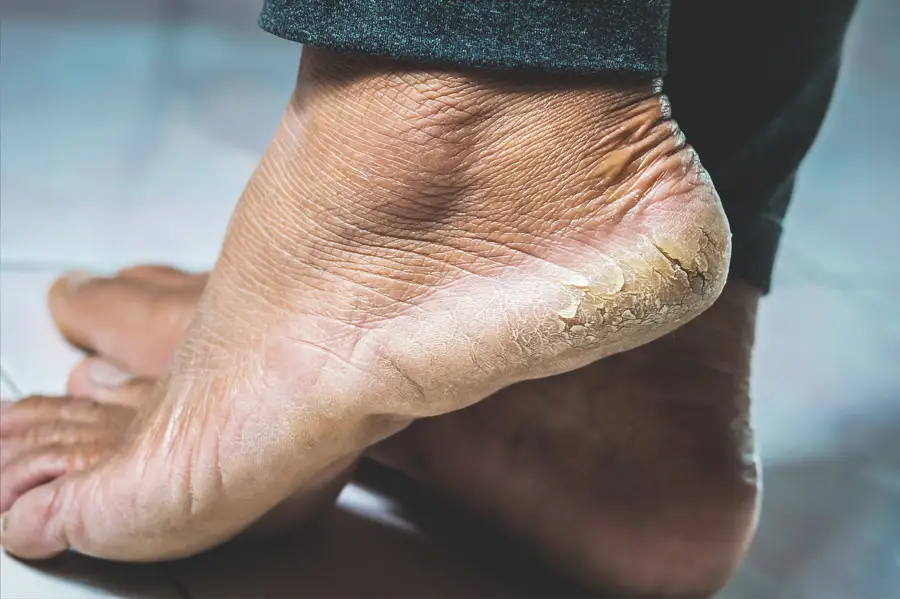What Causes Cracked Heels and Some Viable Treatment Options

Cracked heels are a common foot ailment caused by a combination of elements, including dry skin, genetics, and standing for long periods. While the problem can often be remedied with home care treatments, cracked heels may require professional intervention in some cases.
In this article, we will explore what causes cracked heels and provide information to treat cracked heels. We’ll also discuss prevention methods to help you keep your feet healthy and crack-free!
Cracked Heels
Heel fissures are a medical term for cracked skin. This problem can often be quite painful and, in some cases, may require professional intervention. Various factors can contribute to heel fissures, including dead skin, genetics, and standing for long periods. Thankfully, several home care treatments can help to remedy this issue. However, cracked heels may require professional medical attention in more severe cases.
If left untreated, cracks on the feet can enlarge and cause significant pain. However, many home care treatments can help to remedy the problem. However, professional medical attention may be required if the cracks are more severe. If left untreated, more serious problems such as infection and non-healing wounds can occur.
Common Causes Of Cracked Heels
There is a combination of aspects that can contribute to cracked heels, including:
Moisture Deficiency
The most prevalent cause of broken heels is moisture deficiency. This is much worse in the colder months when the humidity is down, and the heat is on. On the other hand, summertime sandals and backless shoes can also be a cause of dry, cracked heels as well. Genetics, including skin diseases such as eczema, and psoriasis and medical conditions such as thyroid and kidney disease, can lead to cracking of the heals and painful fissures. While home care treatments can often remedy the problem, cracked heels may require professional medical attention in more severe cases. Moreover, staying hydrated and applying moisturizing creams to the feet daily is essential.
Dehydration
In some cases, cracked heels may be caused by dehydration. This can occur due to excessive sweating or simply not drinking enough water regularly. Drinking plenty of fluids and keeping your feet well moisturized is essential to prevent this problem.
Vitamin Deficiencies
A lack of vitamins and other minerals essential to maintaining a good diet, including iron and zinc, might hurt your health. This ensures you get the recommended daily allowance of all essential nutrients. You can do this by eating a balanced diet and supplementing as needed. Additionally, keeping your feet well moisturized can help to prevent cracked heels.
Aging Skin And Pressure
As we age, our skin fails its elasticity. This can make it more prone to cracking and dryness. Additionally, an increase in pressure on the heels might exacerbate this problem. Some potential causes include walking barefoot or wearing ill-fitting shoes that put undue stress on the heels.
Obesity
One of the most ordinary causes of cracked heels is that being overweight can put more strain on the heel. This excess pressure can cause the skin to break and crack, leading to discomfort and pain. To help prevent obesity, maintaining a healthy weight is essential. Additionally, wearing supportive shoes and using a foot cream can help to keep the heels healthy.
Hygiene
While poor hygiene can undoubtedly contribute to cracked heels, it is usually not the sole cause. In addition, poor foot hygiene can lead to fungal infections that may require professional medical treatment. Thus, keeping your feet clean and well moisturized is essential to prevent cracking.
Medical Conditions
Cracked heels can also be caused by other skin conditions, such as athlete’s foot, psoriasis, eczema, thyroid disease, diabetes, and other skin conditions. Suppose you are experiencing cracked heels and suspect they may be related to one of these conditions. In that case, it is important to seek professional medical attention.
Symptoms Of Cracked Heels
The most common symptoms of cracked heels include dryness, peeling, flaking skin, redness, and heel pain. After some time, the affected area can turn yellow or brown and stiffen considerably. In severe cases, the area may even develop a foul odor. Suppose you notice these symptoms in your feet. In that case, it is important to confer with a medical expert as soon as possible to prevent further damage.
In more severe cases, bleeding might occur from the cracks on the heels. Additionally, suppose you experience a sudden increase in pain. In that case, it is essential to pursue a medical alert as soon as possible.
How To Prevent Cracked Heels
Aside from getting professional medical treatment and maintaining proper foot hygiene, there are several home treatments you can do to control cracked heels. These include:
- Maintaining a healthy weight: Being overweight puts undue pressure on the feet and can result in cracked heels. To help prevent obesity, eating a healthy diet and exercising regularly are essential.
- Wearing supportive shoes and avoiding walking barefoot: Wearing shoes that fit correctly and provide adequate support can help to prevent cracked heels due to pressure on the feet. Additionally, it is important to avoid walking barefoot, as this can put additional strain on the feet.
- Keeping your feet well moisturized at all times: Moisturizing the heels regularly can help to protect them from cracking due to dryness. This can be done with good foot cream or other similar products.
- Avoid harsh products: Using harsh soaps or other products on the feet can dry the skin and lead to cracking. It is important to avoid using strong detergents and chemicals when cleaning your feet to prevent this.
- Keep hydrated: It is also important to stay well hydrated at all times, as this can help to keep the skin on your feet healthy. Additionally, drinking plenty of water daily may help prevent obesity, which can put additional strain on the heels.
- Seeking professional medical treatment if needed: Underlying medical conditions or infections sometimes cause cracked heels. If you notice any symptoms of these problems, it is important to seek professional medical attention as soon as possible. This can help to prevent further complications and ensure proper treatment.
- Extreme weather conditions: Cracked heels can also be caused by severe weather conditions, such as very hot or cold temperatures. To help prevent this, it is important to protect the feet from these conditions whenever possible. These include wearing appropriate footwear or using moisturizing products regularly.
Following these tips can reduce your risk of developing cracked heels and keep your feet healthy and beautiful.
Common Doctors Treatment Options
There are several treatment options for cracked heels, depending on the severity and underlying cause of the condition. The most common treatments include:
Strapping
If you are experiencing cracked heels, it is important to protect the skin from further damage. One method to do this is by covering a dressing around your painful heel cracks. It is used to relieve dry skin in place and prevent it from shifting.
To help prevent further damage to the heels, a doctor may strap the affected area to protect it from additional pressure. This might include using specialized orthotics (shoe inserts) or strapping tape directly onto the skin.
Debridement
If the cracks in your heels are severe, a doctor may recommend debridement. During this procedure, the affected skin will be removed to allow new, healthy skin to grow in its place. This can help to prevent serious complications and promote healing. The doctor may take a scraping of your skin to send for a culture if an infection is suspected as the cause of your dry, cracked heels.
Prescription Medications
Prescription creams typically have more active chemicals, such as urea, lactic acid or salicylic acid to battle the dryness. Therefore, it is necessary to observe the doctor’s instructions when using these products, as they can cause further damage to the skin if misused.
If the culture taken by your doctor comes back with a report of fungus or bacterial infection as the cause of your cracked heels, a prescription antifungal or antibiotic cream may be necessary.
Skin Adhesive
Sometimes, a doctor may use skin adhesive to help close the cracks in your heels. However, this is typically only done as a temporary treatment and is often combined with other methods of healing cracked heels, such as using special creams or medication.
Shoe Inserts
Suppose your doctor feels that shoe inserts will help to allocate your weight more evenly and provide better heel support. In that case, they may recommend purchasing and using a pair regularly. This can help to prevent further damage to the heels and promote healing.
Book An Appointment For Your Cracked Heels
If you are experiencing cracked heels and need help finding the right treatment, consult a doctor today at Northern Ankle Foot Associates. They can recommend the best action based on your needs and medical history.

